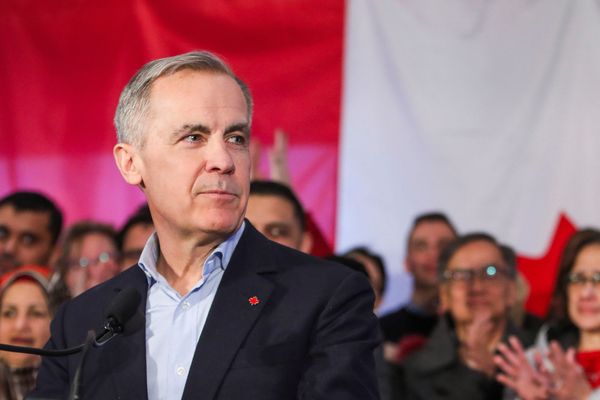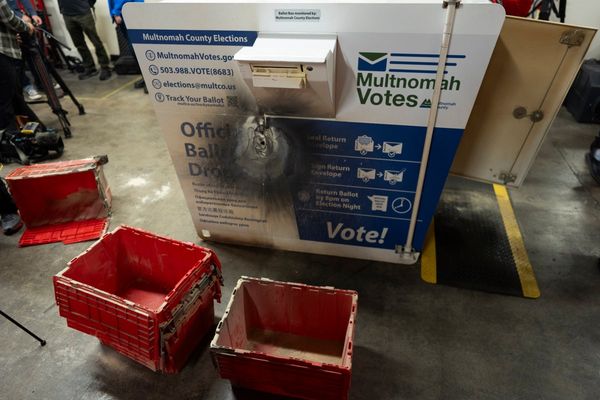
TEL AVIV, Israel—The political marriage of Israel’s two Benjamins—Benjamin Netanyahu and Benny Gantz—was rocky from the start. Now it might be unraveling.
A governing coalition the two men formed just four months ago, with Netanyahu serving as prime minister and his rival Gantz as defense minister, was supposed to give Israel the stability required to tackle the coronavirus pandemic. But the infection rate has surged in recent weeks, and the two men have squabbled over large and small matters, including most recently the passage of Israel’s budget.
Though the dispute might seem technical—Gantz wants a two-year financial plan, while Netanyahu is pushing for a shorter one—analysts say the budget battle signals something broader: an attempt by Netanyahu to dodge his corruption trial, which kicks into high gear in January 2021, and renege on a rotation agreement that would make Gantz prime minister late next year.
If the two men can’t settle their differences by Aug. 24, the deadline for a budget bill, the parliament would automatically be dissolved and a date would be set for yet another national election, Israel’s fourth in less than two years. Netanyahu already seems to be gearing up, making two campaign-style visits to local food shops in the past week.
“[Netanyahu] is not happy with the marriage, and that he has to rotate [the premiership] in a year from now. There’s a competition with Gantz on everything. He has a backseat driver, and he can’t stand it,” said Aviv Bushinsky, a former spokesperson for Netanyahu. “They don’t trust each other. They don’t work well together. It’s horrific.”
Gantz and Netanyahu have clashed over everything from Netanyahu’s push to unilaterally annex the occupied West Bank to a wave of protests around the country and outside Netanyahu’s official residence in Jerusalem calling for his resignation. While Netanyahu described the Jerusalem demonstrations as an attempt to trample democracy, Gantz called them the “lifeblood” of democracy.
Their partnership was forged in March after a vote left neither Netanyahu’s Likud party nor Gantz’s Blue and White with a clear majority. With cases of the coronavirus surging daily and the country headed for lockdown, Netanyahu appealed to Gantz to team up in an emergency coalition.
Gantz consented, breaking his promise to refrain from any partnership with Netanyahu as long as the Israeli leader faced indictments for fraud and bribery. By May, the two sides concluded an elaborate agreement that allowed Netanyahu to remain in office while his trial proceeded and promised Gantz a turn as prime minister starting in November next year.
But the agreement left an exit option for the prime minister: Israeli law stipulates that the new government must pass a budget for the current fiscal year in parliament within its first 100 days or face a new election. Though Netanyahu and Gantz agreed in May to pass a two-year spending plan covering both 2020 and 2021—to ensure coalition survival through the end of next year—Netanyahu now insists on a one-year plan.
“The budget is not the reason for the political crisis, it’s just a pretext. It’s the easiest available way out of the [coalition] agreement and dodge the rotation. If they pass the budget, Netanyahu won’t have any easy way out,” said Yohanan Plesner, the president of the Israel Democracy Institute.
A survey by the institute found only 28 percent of the public supports dissolving the government and holding a new election. As in other countries buffeted by the pandemic and the attendant economic shutdowns, Israel’s unemployment has surged in recent months. Earlier this week, Bank of Israel Governor Amir Yaron called on the government to pass a fiscal plan and cautioned that a new election would hurt the economy. Despite the economic crisis and unrest in the streets, Netanyahu is focused on avoiding his trial and a possible ruling by Attorney General Avichai Mandelblit that would force the prime minister to take a leave of absence, Plesner said.
“Netanyahu’s personal interests are not compatible with the national interest. He fears that the public will see him sitting in court three days a week,” he said. “It will bring home the point that, rather than being a full-time prime minister, he’ll be a part-time prime minister.”
Netanyahu has denied suggestions that he’s steering the country toward another vote.
A snap election could play in Netanyahu’s favor. Gantz appears to have suffered politically from his decision to join the government, according to opinion polls. One conducted by Israel’s public broadcaster KAN this month found that only 10 percent of Israelis consider Gantz to be the most suitable candidate for prime minister—while 37 percent favored Netanyahu. Another recent poll conducted by Israel’s Channel 13 television news predicted that Netanyahu’s alliance of right-wing and religious parties would win an absolute majority in the 120-member parliament, a goal it fell short of in the previous three votes.
Such a narrow-based coalition could potentially pass laws insulating Netanyahu from prosecution. One proposal Likud members have floated is a bill that would make it impossible to convict a sitting prime minister. Another one would enable the parliament to override decisions of Israel’s Supreme Court.
Gantz has stood firm so far on the budget fight but has much to lose if no compromise is reached—including his turn as prime minister next year.
“His whole reason for going to the government is because of corona, and not dragging everyone to elections, so Bibi is taking advantage of that,” said Jonathan Rynhold, a political science professor at Bar-Ilan University, referring to Netanyahu by his nickname. “Because Bibi is prepared to impose more damage on the country than Gantz to advance his political interests, that gives him room for maneuver.”
To be sure, a new election would be no cakewalk for Netanyahu either. Public approval of his handling of the pandemic has plummeted as second-wave infections surged over the summer. Polls show Netanyahu’s Likud party losing seats in the event of a new vote.
“It’s not the time to go to elections when people are in the streets, and there’s a high unemployment rate, and people can’t afford their bills, and the economic future of the country is in question,” said Mitchell Barak, an Israeli American public opinion expert and a former advisor to Netanyahu.
On the other hand, Netanyahu seems to be at his strongest when he has the rest of Israel’s parliament guessing what his next move will be. “He thrives in an environment of political chaos,” Barak said.







